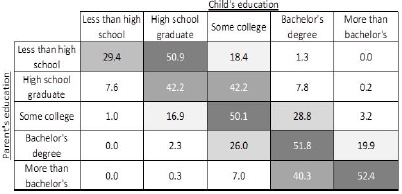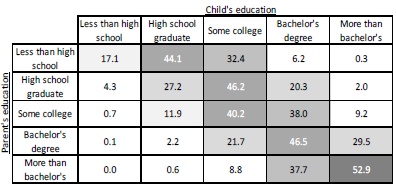Abundant adoption and twin studies find minimal long-run nurture effects. In plain language: The family that raises you has little effect on your adult outcomes. A key caveat, though, is that almost all of these studies come from the First World. Does growing up elsewhere durably stunt personal development? Existing evidence is largely silent.
While reading the National Academy of Sciences all-new report on The Economic and Fiscal Consequences of Immigration, though, I finally encountered some relevant data – though unfortunately, it only allows us to measure the effect of growing up in the U.S. versus anywhere else.
Background: To estimate an immigrant’s long-run fiscal effect, you must also estimate how successful his descendants will be. The NAS explains its method:
In order to forecast taxes and benefits for an average immigrant and descendants, it is necessary to first forecast the ultimate educational attainment for young immigrants and the future educational attainment of the offspring of immigrants. The panel predicted the education of offspring as a function of parental education using regression analysis based on CPS samples 15 years apart… Adult child education is regressed on parental education by birth region, with separate equations for native-born children versus foreign-born children. This generates equations that are used to predict a child’s ultimate educational attainment…
Big finding: Children of immigrants have markedly greater educational success than you would expect given their foreign-born parent’s education. While children always tend to resemble their parents, the resemblance is stronger when both child and parent are native-born.
Estimates for children of natives:

Estimates for children of immigrants:

The most striking achievement gaps: Less than 20% of children of native-born high school dropouts go beyond high school, but almost 40% of children of foreign-born high school dropouts pass this milestone. Similarly, about half of children of native-born high school grads surpass their parents’ attainment – versus over two-thirds of children of immigrant high school grads.
What does this teach us about the power of nurture? For the sake of argument, assume that everyone born in the United States enjoys the same educational environment, so genes (and luck) explain all remaining disparities.* Then we can use immigrants’ children’s success to measure the stunting effect of growing up outside the United States! Intuitively: If a native and an immigrant’s children perform equally well, we should infer that their parents had equal genetic potential.
For convenience, let’s code the five educational categories as continuous variables: less than high school =1, high school graduate =2, some college =3, bachelor’s degree =4, more than bachelor’s =5. Then here is children’s average educational attainment E, conditional on their parents’:
|
|
Expected Child’s Education (E) |
|
|
Parental Education |
Native Parent |
Immigrant Parent |
|
1 |
1.9 |
2.3 |
|
2 |
2.5 |
2.9 |
|
3 |
3.2 |
3.4 |
|
4 |
3.9 |
4.0 |
|
5 |
4.4 |
4.4 |
We can use this information to construct another table mapping immigrants’ observed education into their potential education – i.e., the education they would have acquired if they’d been born in the United States. Example: The American-born children of immigrants who didn’t finish high school (E=1) have average attainment E=2.3. That’s two-thirds of the way between kids of natives who didn’t finish high school (E=1.9) and kids of natives who finished high school (E=2.5). In other words, immigrants with E=1 have the kids you’d expect from parents with E=1.67! Filling in the rest of the table:
|
Immigrant Education |
Environment Deprivation |
|
|
Actual |
Potential |
|
|
1 |
1.67 |
-.67 |
|
2 |
2.57 |
-.57 |
|
3 |
3.29 |
-.29 |
|
4 |
4.20 |
-.20 |
|
5 |
5.00 |
-.00 |
Now we’re ready to calculate the nurture effects of national origin. There’s no harm at the tip top: Non-Americans with advanced degrees look intrinsically no abler than Americans with advanced degrees. As you move down the educational ladder, however, environmental deprivation goes from moderate (-.20 steps for college grads) to serious (-.57 steps for high school grads, -.67 for less than high school). And if you think that American-born children of immigrant parents are also somewhat deprived, their parents’ estimated environmental deprivation is even worse.
Main doubt: The NAS correlates success for individual parents and their kids. In principle, then, kids of immigrants could have one native-born parent – and kids of native-born parents could have one immigrant parent. Ideally, we’d compare kids of two immigrant parents to kids of two native parents. Given the strong correlation in spousal education, though, this probably understates immigrants’ deprivation. Genetically speaking, an immigrant who marries an equally-educated native is “marrying down.”
The implications for immigration are debatable. So are the implications for education. But the implications for nurture effects are clear. If you grew up in a relatively deprived American home, adoption and twin research imply that your educational success would have barely changed. If you grew up in an absolutely deprived non-American home, however, your educational success would have been markedly worse – masking your underlying genetic potential. The broader but still provisional lesson: Nurture matters after all. Behavioral geneticists have struggled to detect nurture effects because of range restriction – not because there’s nothing to detect.
* Whether or not you buy this assumption, it still sets a lower bound on nurture effects. Keep reading.

READER COMMENTS
Jason
Dec 15 2016 at 5:58pm
The word nurture is used to describe the non-genetic effect that parents have on their child. I don’t think that you are measuring that for immigrant parents in any meaningful way by this proxy. I think there are lot of plausible effects and confounders that would be larger than parenting for educational attainment outside of the US. Some examples could be limited access to education, war, famine, local culture, etc. If we find that people outside of the US study less than in the US over a given time period, it doesn’t follow that parents outside of the US are worse than parents in the US. It’s more likely that life outside of the US was – on average – worse than life in the US regardless of parenting skill.
Jess Riedel
Dec 15 2016 at 5:59pm
This is very analogous to height, right? In developing countries height is influenced by wealth/status (mediated by nutrition), but in developed countries it’s almost purely genetic.
The moral being that there isn’t one answer to nature vs. nurture; it depends on the population considered. And it so happens that, for educational attainment and especially for height, the developed countries have picked most of the low-hanging nurture fruit (even for those relatively badly off households). So the remaining variance is mostly explained by nature.
john hare
Dec 15 2016 at 7:11pm
While I read the whole post, the second sentence had me questioning the validity of it. If this were accurate, there would be very few families that are multi-generational poor in this country. A fairly high percentage of people that grow up in certain neighborhoods have low educational and earnings attainments.
AlexS
Dec 15 2016 at 8:22pm
Are the implications for nurture effects really that clear? Shouldn’t your conclusion be quite a bit more modest: “If you grew up in an absolutely deprived non-American home, and you are a member of the selected subgroup that decided and managed to immigrate to the US, however, your educational success would have been markedly worse – masking your underlying genetic potential.”
One can easily imagine why this subgroup might not be representative of the larger group of those raised in a deprived non-American environment. At least, without evidence that they are so as to rule out a very plausible selection bias, your claim about what this study implies seems too strong.
Alex
Dec 15 2016 at 8:40pm
I agree that genetics plays a crucial part, but also nurturing is very important. For example, even though being more impulsive is very likely to be genetic, crossing the line and becoming a murderer has a lot to do with nurturing or child experiences.
I don’t buy that there is a “murderer” gene.
Same for being a rapist, or a child molester.
MikeP
Dec 15 2016 at 9:04pm
This appears to me to be a special case of the “raised by wolves” exception to nature versus nurture debate.
If you grew up in the US in a household that outright discouraged education, you probably would not attain the education that you would have in an otherwise equal household that did not discourage education.
Well, this is measuring people who grew up in whole societies that discouraged — or at least could not or would not afford — education. The fact that the differences cap out at post-graduate education is further evidence of this: such societies often educate their meritocratic elites to the max but do not educate the masses beyond subsistence.
As another example, I doubt the numbers for European immigrants differ much from those of US natives.
Alan
Dec 16 2016 at 12:55am
Another confounding factor: high school degrees are handed out like Halloween candy in the United States. I’ve even worked with a high school graduate who was unable to read his own diploma. It doesn’t take any special ability to get one of these diplomas – it just takes a commitment to keep attending the indoctrination center no matter how boring and irrelevant it is. By contrast, in some parts of the world a high school diploma is more similar to a college diploma in the U.S.
Beyond that, there is simply no easy way to compare educational systems around the world, but the U.S. is widely regarded as being easier than most, though our top institutions have a good reputation.
I’m doubtful that this study tells us ANYTHING. Too many variables.
Ryan
Dec 26 2016 at 3:34pm
Does this overstate the effect though? I would guess that the people willing to move their family across the globe are generally more ambitious than their counterparts that stay in their country of origin. If so, we shouldn’t assume that the described nurture effect is as strong for foreigners that haven’t immigrated.
AS
Dec 27 2016 at 10:22am
The problem is the effect of nurture is limited to parenting, but real nurture is much more diverse than that, including but not limited to, the place you are raised in, and what other people and media you are exposed to. This research dips into that a bit.
Especially with digital media we are increasingly moving towards a single set of opportunities and information exposures for everyone with an internet connection.
Comments are closed.